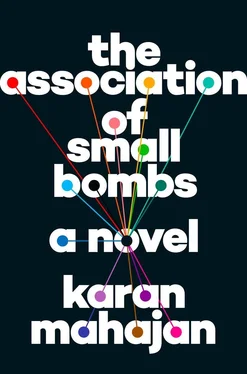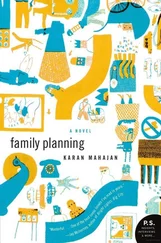When his wife received guests and held out Anusha to them, he imagined gunning them down.
“Can we go with you, Papa?” Tushar and Nakul asked.
Vikas stood in the drawing room on a summer day. It was hot and the air was shrieky with pressure-cooker hoots and honks. He did not want to take them on the shoot. He had no desire to be a father, had always considered himself above these things, and yet there were now these two boys filling up his drawing room, issuing commands and requests, their sullen persistence reminding him of nothing more than the members of his extended family, those disappointed creeps who pressed on and surrounded him at all times.
“Why do you keep doing that to your wrist?” Vikas asked Nakul. Nakul had been flicking his wrist donnishly, an action he seemed to have picked up from his uncle, Mukesh. “Are you a sardar? Do you have a kara there?”
Nakul’s handsome face hung.
“Yah, don’t do that,” Tushar chimed in.
“You take care of your brother, Tushar. I have to go.”
Divide and rule. It wasn’t just the British toward the Indians but all parents toward their children.
Vikas was awfully partial toward Tushar, though he would have never acknowledged it. Nakul was popular in school, good at sports, intense, competitive, moody — just like Vikas, in other words — whereas Tushar was lumpy, effeminate, eccentric, troubled, getting pushed around in school, and moseying up to his mother in the kitchen with the halting eyes of an abused animal, always eager to please, reading the newspaper and engaging his father in incessant chatter about politics, a pet topic for him, one he had honed through quiz competitions in school, the one area in which he shone.
Still, Vikas did not like the younger one. He found him entitled and bad-tempered. “All your good marks mean nothing if you don’t have a good personality,” he lectured Nakul, as if a good personality could be hammered into a child with hate.
“You’re too hard on him,” Deepa said at night. She lay next to him in the cabin of the bedroom, the walls pressed close with night, the TV on the side basting their bodies with light. They took some time to themselves before the boys jumped into bed with them.
He did not like being lectured by his wife. Whenever she told him he was being partial, he spent a few days ignoring both of the boys, and that’s what he did now, closing his eyes and sulking into sleep before the boys climbed aboard.
He dreamed fantastically. He’d always been a dreamer. In the dreams, all the parts of his life came together. Film, family, mother, father, characters, children. Life is fragmentary but dreams are not. This is why, later, he would put so much stock in the bomb dreams.
________
A few months before the blast, Nakul stole a toy from a friend. Vikas heard about it from his schoolteacher, Sudha Ma’am, and then from Mrs. Aggarwal, the mother of the friend. “When he came over, he took Mayank’s GI Joe,” she complained with a lazy, lecherous indifference, as if pleased that this disease of immorality was spreading. “I found it in his pocket. It’s not a problem — they’re just boys — but I wanted to tell you.” At home, Vikas confronted Nakul. “Haven’t we given you everything?” Nakul reprised his morose expression. He fiddled with the imaginary kara on his wrist. At that moment, Vikas caught sight of the satellite dish rising up from the roof of the CEO’s mansion across the street, noticed how it exaggerated the dilapidation of the Khurana complex, its hanging electric wires and busted driveway.
It was impossible to make any money as an independent filmmaker in Delhi. A tight-knit circle of friends supported each other in their endeavors — got together and discussed Scorsese and Fellini and Godard, hosted film festivals and also peopled them — but the audience just did not exist. Indians sometimes read literature but there was no appetite for serious movies. The filmmakers, all idealistic middle-class types, succumbed to alcoholism, depression, poverty. One couple moved into a slum to finance their film. Years later, the female half of this couple wrote The God of Small Things . A novelist became the biggest star of the independent film world in India.
Vikas was well placed when compared to his cohort. He had his flat in the heart of Punjabi Delhi (Maharani Bagh, at the time of independence, when it had been founded, had been at the very outskirts; now the city in its growth had smuggled it to the center). He had money saved up from his time as a CA. He made commercials and corporate videos for brands like Amul and Nirma and Weekender. He penned a film review column for the Pioneer . His wife, once an aspiring actress, was supportive. And yet, while the country boomed and erupted with money, he stayed steady or declined. He had an urge to blame his self-consciousness on his kids, who were constantly demanding things, but he knew his own mind was warped by money.
It was only when he was deep in a project — erased by filming and writing — that his anxieties subsided. For this reason he worked all the time, kept a low profile in the colony, hardly talked to his relatives.
He took loans, finally, from his brother. This was his ultimate moment of shame. Vikas had four siblings. They were all deeply estranged. Their father had disapproved of every marriage. The siblings had been, consequently, wild. Rekha lived in Bombay; Raakhi, in Shillong. Arun practiced dermatology in Dehra Dun. Only Rajat remained in Delhi. He too could have claimed the property in Maharani Bagh, but he had gallantly declined. Vikas felt nervous around him. Artists, who are selfish people, become anxious around the self-sacrificing. Now he was approaching him for money? Impossible. And yet he went one day with his kids to visit Rajat. Rajat was hassled too, in his Friends Colony flat, drowning in in-laws, kids, responsibilities — he could never say no to responsibilities. Quickly, with eager, wobbling hands, he counted off the cash. Rajat was happy for this connection with his unstable brother. If it takes money to bring us together, so be it.
Vikas, now flush — Rajat had given him more than necessary — spent generously on his sons, taking them to the markets: to Rio Grande in GK Market, to Sehgal Brothers in South Ex, to Honey-Money Top Sports in Lajpat Nagar. Some of it was done behind his wife’s back. He wasn’t honest with her about how much he’d got, and when she found out, she was incensed. Her voluble nostrils flared. She believed she deserved the money too. “How many years I’ve supported you and I’ve never asked that we take a holiday once. They’re spoiled enough already. Besides, they won’t be artists like you,” she said. “They’ll make money.”
Why couldn’t he let his wife spend? Because he had an urge to win love, and his wife’s, in a way, had been won and lost a long time ago.
________
One day, he was working from the bedroom, storyboarding in a scrapbook, when Deepa came home fuming, having picked up the boys from school. From the boys’ swollen rigid faces he could tell that some kind of fight had transpired in the car. Nakul’s glycerin-perfect hair was ruffled. Tushar stared out angrily from his girly face, clapping his chapped lips — a rare look of defiance. Deepa sat the boys down at the dining table and then instructed Vikas to join them all.
“When I went to pick them up from school today,” she said, “first they refused to get off the bus. Then, when these two idiots got into the car, they put their blazers on their faces so that the kids in the bus wouldn’t see them. Can you believe it?” She scooped back her hair with her palm, as she did when she was furious. “They’re ashamed of the Fiat.” (Vikas’s old Fiat.) “They’re ashamed of us.” She looked at them, at their frightened faces — though only Nakul looked contrite, while Tushar had the smirking guiltless look of a victim who has just learned how to strike back. “Shame on you two. Is this what you’re learning? Do you know how many people live in poverty?”
Читать дальше












